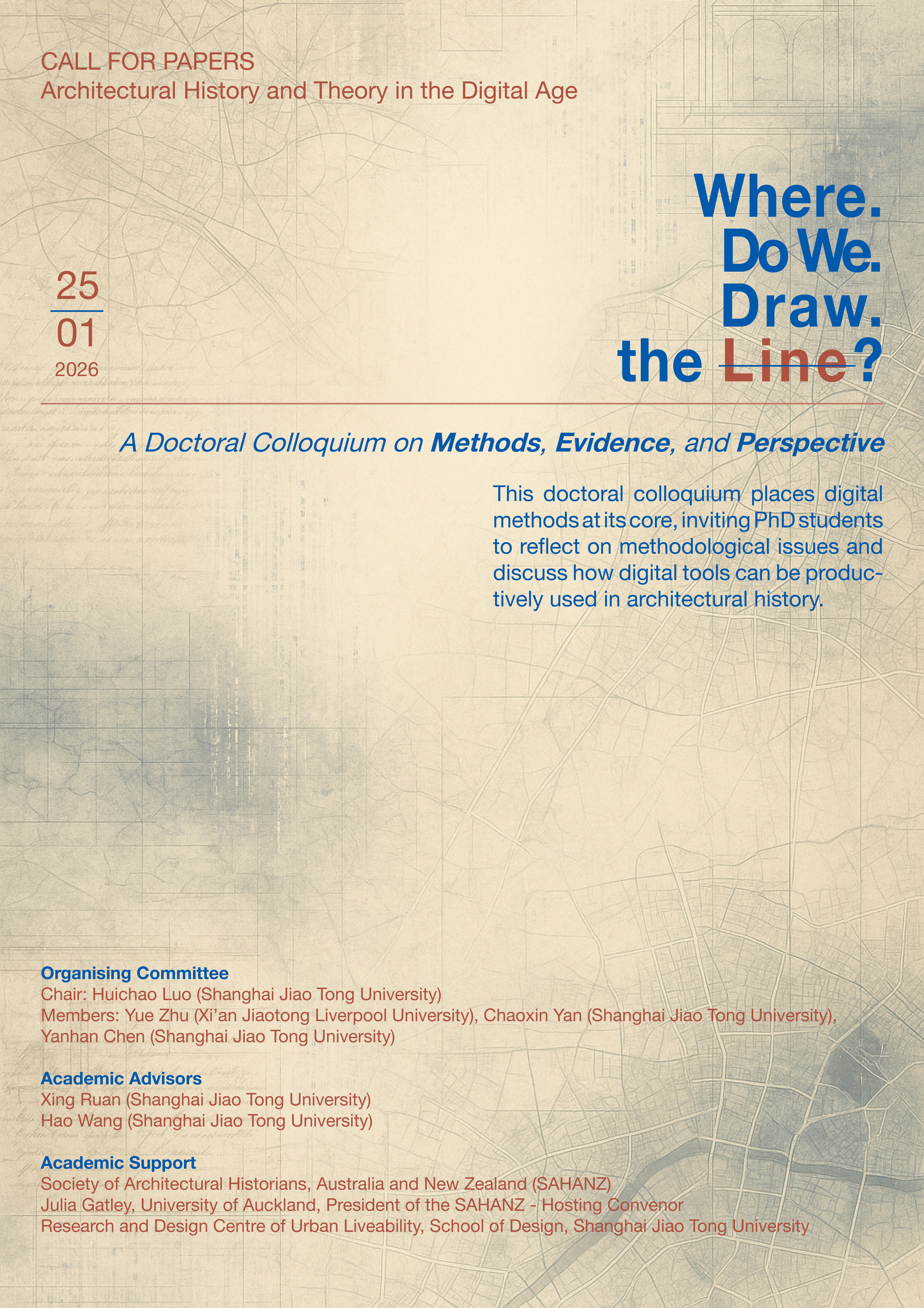CALL for PAPERS
Architectural History and Theory in the Digital Age


Poster: Designed by Huichao Luo,
background image generated by AI
SAHANZ PhD Colloquium
我们所处的时代,技术在瞬息之间更新,数字逻辑正在改写文化的痕迹。建筑史,这一根植于社会与人文的学科,也正因此迎来方法与视角的新转折:它不再只是被动应对潮流,而是主动开拓新的路径。新一代学者们由此发问:来处何在?去向何方?而当下,身在其中的我们又该如何安放自身?这些问题既是对世界、对学科的追问,也是对自我的探索。
2025 年澳大利亚新西兰建筑史学会(SAHANZ)博士生论坛,将由上海交通大学设计学院宜居城镇设计研究中心承办,以“何以为界?”为题,共同思考“数字”这一建筑历史研究中不可回避的新路径。这不仅是该论坛首次由中国高校主办,也是设计学院首次举办的博士生国际学术盛会。来自不同学科与地域的青年学者将在此汇聚,探寻数字时代建筑史的边界。
本论坛旨在汇集博士生群体的视角与热情。数字技术为学科开辟了新的机遇,同时也带来了新的挑战。论坛希望通过青年学者的交流与实践,展开对虚拟与现实之间张力的深入讨论,并以思考与知识为力量,共同回应这一时代的课题。
Colloquium Theme
Where Do We Draw the Line? Architectural History and Theory in the Digital Age
A Doctoral Colloquium on Methods, Evidence, and Perspective
Digital tools have not been widely adopted in architectural history because they have long sat uneasily with a discipline centered on social and cultural concerns. In recent years, however, digital methods for processing and mining archives have been taken up by a growing number of scholars. At the same time, the supposed universality of digital technology is often treated as a cross-cultural instrument that can reduce misunderstanding and close distance, yet this claim still needs careful testing. Digital tools also open new possibilities: unprecedented access to information can make researchers feel “all-knowing,” raising the question of whether this enables us to rebuild discourse and construct knowledge from noncentral perspectives.
Against this backdrop, this doctoral colloquium places digital methods at its core. It invites doctoral students to share methodological reflections and discuss how these tools can be used productively and what they mean for architectural-historical research. We hope to prompt every doctoral student in architectural history to reflect on their own position and perspective.
Sessions
Session 1.
Digital Workflows, Technical Standards & Methodological Innovation
Session 2.
Data, Evidence & Historiographical Claims.
Session 3.
Method as Boundary: Where do we stand?
* All sessions of the colloquium will be conducted in English.
We invite contributions that critically probe this turning point. Possible angles include:
Maps that “tell” history: GIS, spatial statistics, and the cartographic imagination.
Digital modelling and urban re-enactment: 3-D reconstructions, speculative simulations, and their historiographic claims.
Ethics of method: do new technologies illuminate or erode notions of historical truth?
Archives after the digital turn: reading maps, photographs, and permits as data; confronting copyright and curation dilemmas.
From text to data: are we rewriting architectural history when we translate narrative sources into structured datasets?
Writing otherwise: how do visualisations, dashboards, or interactive platforms extend or unsettle conventional scholarly prose?
These angles are not exhaustive, and we also welcome broader methodological reflections. By sharing work-in-progress, doctoral researchers will chart the opportunities and limits of digital methods, clarify their epistemological implications, and sketch future paths for a critically informed, technically agile architectural historiography.
* For more information about the colloquium, please refer to SAHANZ's official website: https://www.sahanz.net/events/where-do-we-draw-the-line-architectural-history-and-theory-in-the-digital-age-sahanz-phd-colloquium-2025/
Keydates
Abstract Deadline
20 October,2025
Acceptance Notification
10 November, 2025
Participation Registration form
30 November, 2025
Colloquium Dates
25 January, 2026
Submission Guidelines
Abstract length: up to 300 words (in English) Submission email: huichao.l98@gmail.com
* All presenters must be members of SAHANZ. Information on membership and how to join can be found here: https://www.sahanz.net/about/membership/
Colloquium Times
China (CST)
25 January 2026 09:00–16:00
Australia (AEDT, East Coast)
25 January 2026 12:00–19:00
New Zealand (NZDT)
25 January 2026 14:00–21:00
* The colloquium will be held online.
Academic Advisor
RUAN Xing
Dean and Guangqi Chair Professor of Architecture at School of Design, Shanghai Jiao Tong University
WANG Hao
Assistant Professor, School of Design, Shanghai Jiao Tong University
Academic Support
Organizer
Society of Architectural Historians, Australia and New Zealand (SAHANZ)
Hosting Convenor
Julia Gatley
University of Auckland, President of the SAHANZ
Commissioner
Research and Design Centre of Urban Liveability, School of Design, Shanghai Jiao Tong University
Organizing Committee
Chair
LUO Huichao
PhD student, Shanghai Jiao Tong University
ZHU Yue
PhD student, Xi'an Jiaotong-Liverpool University
YAN Chaoxin
PhD student , Shanghai Jiao Tong University
CHEN Yanhan
PhD student, Shanghai Jiao Tong University